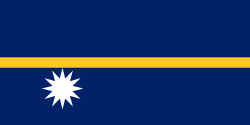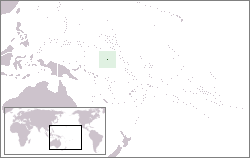

The following outline is provided as an overview of and topical guide to Nauru:
Contents
- General reference
- Geography of Nauru
- Environment of Nauru
- Demography of Nauru
- Government and politics of Nauru
- Branches of the government of Nauru
- Foreign relations of Nauru
- Law and order in Nauru
- Military of Nauru
- History of Nauru
- Culture of Nauru
- Art in Nauru
- Sports in Nauru
- Economy and infrastructure of Nauru
- Education in Nauru
- Infrastructure of Nauru
- See also
- References
- External links
Nauru – sovereign island nation located in the Micronesian South Pacific. [1] Its nearest neighbour is Banaba Island in the Republic of Kiribati, 300 kilometres (190 mi) due east. Nauru is the world's smallest island nation, covering just 21 square kilometres (8 mi2), the smallest independent republic, and the only republican state in the world without an official capital. It is the least populous member of the United Nations.
Initially inhabited by Micronesian and Polynesian peoples, Nauru was annexed and designated a colony by Germany in the late 19th century, and became a mandate territory administered by Australia, New Zealand, and the United Kingdom following World War I. The island was occupied by Japan during World War II, and after the war entered into trusteeship again. Nauru achieved independence in 1968.
Nauru is a phosphate rock island, and its primary economic activity since 1907 has been the export of phosphate mined from the island. [2] With the exhaustion of phosphate reserves, its environment severely degraded by mining, and the trust established to manage the island's wealth significantly reduced in value, the government of Nauru has resorted to unusual measures to obtain income. In the 1990s, Nauru briefly became a tax haven and money laundering centre. Since 2001, it accepted aid from the Australian government; in exchange for this aid, Nauru housed, until early 2008, an offshore detention centre that held and processed asylum seekers trying to enter Australia. [3]

